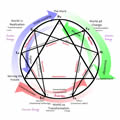How many kinds of Reasoning are there?
2015-01-15
I haven’t wanted to highlight this question, as it can be a little discouraging. But it came up today in one of our sessions, so we need to face the reality of what we have to work with. Fortunately for us, we’ve already covered a significant number of these approaches, and so the situation is not as daunting as it might at first appear.
So how many ways of Reasoning are there? The simple answer is “lots”. An even simpler answer is, just one… because there is only one reality, and the aim of our reasoning process is to contact that reality.
That said, in standard, off-the-shelf reasoning, most authorities start with deductive and inductive reasoning. Here’s an example of deductive reasoning:
- All men are mortal.
- Socrates is a man.
- Therefore, Socrates is mortal.
The first premise states that all objects classified as "men" have the attribute "mortal". The second premise states that "Socrates" is classified as a "man" – a member of the set "men". The conclusion then states that "Socrates" must be "mortal" because he inherits this attribute from his classification as a "man". http://en.wikipedia.org/wiki/Deductive_reasoning
How can we use deductive reasoning?
- Excessive talking wastes energy.
- I talk way more than I need to talk.
- Therfore: Ahhhh, hmmmm, let’s see now…. Don’t rush me. (rats), how do I talk my way out of this one?
Here are some examples of Inductive reasoning:
100% of biological life forms that we know of depend on liquid water to exist.
Therefore, if we discover a new biological life form it will probably depend on liquid water to exist.
A classical example of an incorrect inductive argument:
All of the swans we have seen are white.
Therefore, all swans are white.
Inductive reasoning is inherently uncertain. It only deals in degrees to which, given the premises, the conclusion is credible according to some theory of evidence.
Unlike deductive arguments, inductive reasoning allows for the possibility that the conclusion is false, even if all of the premises are true. Instead of being valid or invalid, inductive arguments are either strong or weak, which describes how probable it is that the conclusion is true.
How can we use inductive reasoning?
I see that most people who consistently do inner exercises report significant benefits
If I consistently do inner exercises I’m likely to benefit.
This example may appear to be obvious and of little value. But that’s probably because we are inwardly ignoring the truth of the corollary inductive reasoning:
If I consistently do NOT do inner exercises I’m likely to NOT benefit.
There’s much more on the internet about these two forms of reasoning, and more besides, but that’s probably enough for today.
- John Hutcherson's blog
- Log in to post comments
